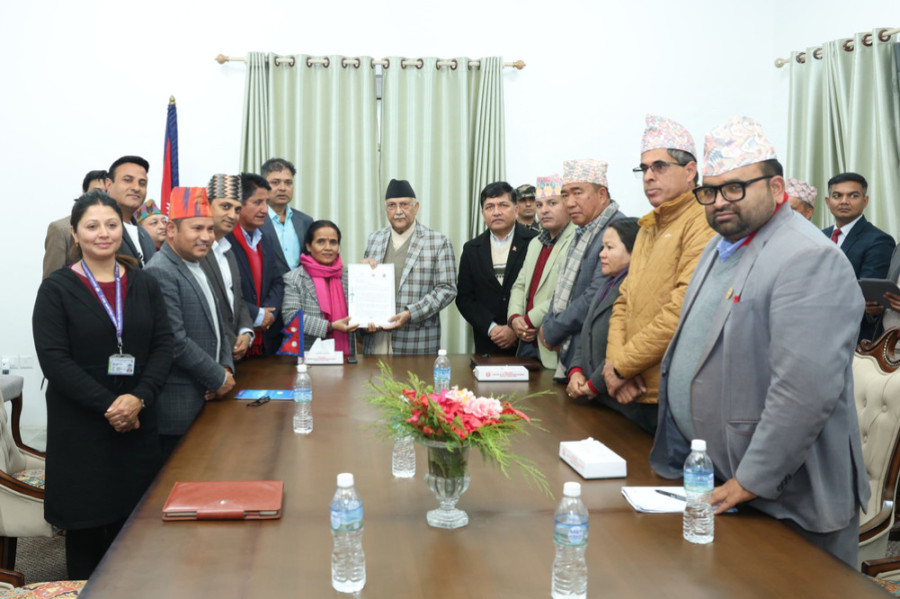National
Local governments push PM to act on unfulfilled promises
Representatives seek swift action on grants, legislative coordination, and land management rights.
Binod Ghimire
Local government representatives on Friday demanded Prime Minister KP Sharma Oli implement the National Coordination Council’s previous decisions and call its third meeting to discuss coordination issues among the three tiers of government.
Submitting a memorandum to the prime minister, representatives of the National Association of Rural Municipalities in Nepal (NARMIN), the Municipal Association of Nepal (MuAN) and the Association of District Coordination Committees of Nepal urged him to take steps to make federalism more functional.
The first meeting of the council led by then-prime minister Pushpa Kamal Dahal in June last year had made six decisions. But most of those decisions made after two days of discussions between the representatives of all tiers of governments remain unaddressed.
Removing ambiguity and duplication in the implementation of laws among the three tiers; cooperating while making laws related to concurrent powers; and formulating and implementing laws essential for federalism’s successful implementation were the key decisions made by the first meeting.
Likewise, improving human resource management and service delivery; guaranteeing a minimum two-year posting for chief executive officers of local governments and a one-year posting for provincial employees; and streamlining the process of land acquisition required for subnational infrastructure construction, were the other decisions from the first meeting.
The Federation, Province and Local Level (Coordination and Inter-relation) Act, 2020 envisions an annual council meeting annually. However, it has met only twice so far.
“Other than demanding that the council’s meeting be called, we have also cautioned him not to cut down on the equalisation grants as was done last year,” said Laxmi Devi Pande, NARMIN chairperson.
The Dahal administration last year cut one fourth of the equalisation grants allocated through the national budget, prompting the representatives of the local units to resort to protest. More than 150 chiefs and deputy chiefs of local units staged a sit-in on the Finance Ministry’s premises in December last year, compelling the federal government to partially release the grants.
“Around 93 percent of the grant was released after our protest,” said Kalanidhi Devkota, executive director at MuAN. “We don’t want the federal government to make the same mistake.”
Local governments get budgets from the federal level as equalisation grants, conditional grants, special grants and revenue-sharing. Equalisation grants are discretionary, allowing local governments/units to allocate funds as needed.
Local governments, for a long time, have been demanding a review of the revenue-sharing model. Of the total revenue collected through the Value Added Tax (VAT) and customs, local and provincial governments receive 15 percent each, while the rest goes into the federal coffers. Similarly, the federal government holds 50 percent of the revenue collected through other sources, while the other two tiers of government receive 25 percent each.
Devkota said they also requested Oli to authorise local governments to handle land registration and land surveys, as envisioned by the constitution. They also asked him to ensure the National Land Commission expedites its work, stating that the frequent making and unmaking of commissions by different governments has created obstacles in settling land-related problems.
The Oli government in October revived the commission, which had been dissolved by the erstwhile Dahal administration. This is the 16th such commission formed since the restoration of democracy in 1990 to distribute land to the landless. Oli said he was positive about calling the council’s meeting on a date convenient for everyone, according to Devkota.
“The prime minister also said the federal government will be generous in budget allocations to the local level,” he said.




 18.12°C Kathmandu
18.12°C Kathmandu














